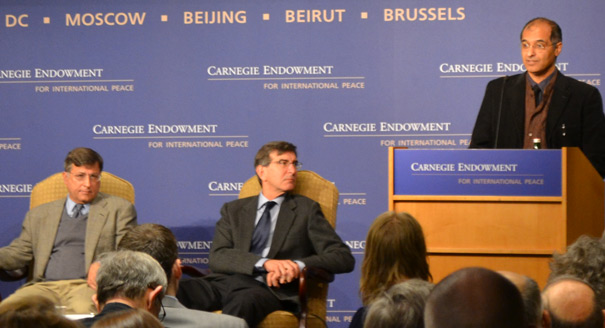Registration
You will receive an email confirming your registration.
The nuclear landscape in South Asia is dynamic–a complex mixture of politics, technology, and emotion. Partisanship and hyperbole often overshadow analysis of important issues. A new edited volume of essays by seventeen Indian and Pakistani experts, Confronting the Bomb: Pakistani and Indian Scientists Speak Out, seeks to ground this debate in solid technical and policy analysis by offering an important and sober perspective on the historical antecedents of today’s dangers, the political and social impacts of the introduction of nuclear weapons on the subcontinent, and the implications of future nuclear technology developments. Carnegie hosted Pervez Hoodbhoy, editor and noted physicist, and Zia Mian, director of the Project on Peace and Security at Princeton University, for a discussion. Carnegie’s George Perkovich moderated.
Discussion Highlights
- The Arms Race in South Asia: Pointing to Pakistan’s decision to block the Fissile Material Cutoff Treaty at the Conference on Disarmament in Geneva, Hoodbhoy noted that the arms race in South Asia presents global challenges.
- Dangers of Tactical Nuclear Warfare: Hoodbhoy suggested that a shift on the subcontinent towards tactical nuclear warfare increases the threat of a nuclear confrontation and the danger of losing command and control of nuclear weapons. Additionally, Hoodbhoy questioned the utility of tactical nuclear weapons, stating that in a war they would be difficult to use effectively.
- Pakistani Nuclear Arsenal Security: Hoodbhoy expressed his concerns about past terrorist attacks that targeted the Pakistani Army, questioning what implications future attacks might have for the security of the Pakistani nuclear arsenal.
- Lessons from Mumbai: Perkovich posited that decreased public support for the Pakistani Armed Forces in the wake of the Mumbai attacks may deter Pakistan’s security forces from tacitly supporting future acts of terrorism. Mian added that Indian restraint after the Mumbai attacks damaged the jihadi movement within Pakistan because it diminished the movement’s ability to project ownership over Pakistani nationalist sentiments.
- Increased Cultural Exchange: Hoodbhoy argued that increased cultural exchange between Pakistan and India constitutes the most critical step toward reducing tensions between the two countries. To facilitate cultural exchange, he suggested that India and Pakistan open their borders to increase contact between the Pakistani and Indian populations.
- Popular Participation on Nuclear Issues: The panelists concurred that the popular discourse within Pakistan on nuclear issues is very limited. Mian noted that the Pakistani government stifles public conversation about nuclear energy due to its ‘sensitive’ and ‘security-related’ nature. Perkovich pointed out that this is not a phenomenon unique to Pakistan – the majority of states that possess nuclear weapons do not have any popular debate over their nuclear weapons programs.
- Nuclear Relations with Saudi Arabia: Hoodbhoy noted that Pakistan and Saudi Arabia have shared very close relations on nuclear issues. Indeed, Saudi Arabia contributed substantial funding for the Pakistani nuclear program. He noted that in the case of a nuclear-armed Iran, Pakistan would be unlikely to provide Saudi Arabia with nuclear weapons; though Islamabad would likely help Riyadh build its nuclear capacity through an exchange of nuclear technology and the provision of Pakistani nuclear engineers.
- On China and the United States: Perkovich noted that India perceives itself to be in a major strategic competition with China in all domains–existentially, historically, culturally, economically, and militarily. He pointed out that long-term strategic competition with China drives defense research and development in India. Mian noted the importance of recognizing the U.S. role in regional competition. Perkovich concurred, noting that the United States seeks to balance China’s regional power through its Nuclear-Cooperation Agreement with India.
